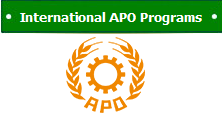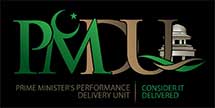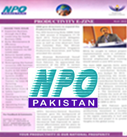Types of APO Projects
The general feature of APO activities is to provide practical training through a combination of; i) lectures by experts; ii) field visits to factories, farms, and facilities for observation of actual applications; and iii) country reports by participants for the sharing of experiences. APO programs are intended to be immediately useful and applicable to participants as possible. The participants are expected to create multiplier effects by disseminating their newly acquired knowledge and understanding to others in their home countries.
APO's activities target a diverse group of productivity stakeholders in member countries. Following are the various types of approaches or methodologies employed in organizing them.
The three-letter codes in parenthesis are used to identify and tag each APO project as seen on Annual Program and Project Notifications.
Research (RES):
To collect and analyze data and information on productivity related topic using a determined methodology.
Study Meeting (STM):
Study meetings are meant to impart knowledge on emerging issues and challenges for policy, planning, and decision making, primarily through resource paper presentations and discussions among expert participants. Only qualified experts and professionals knowledgeable about the subject area are expected to attend study meetings.
Forum (FRM):
Forums are held to provide a platform for discussions, dialogues, and networking for specific stakeholders. Senior and top-level managers, officials, consultants, and academic personnel are expected to attend.
Conference (CON):
A conference to help promote productivity and build consensus among stakeholders on the directions (or redirection) of the productivity movement in a member country. Diverse stakeholders including top/senior representatives from government, business, and unions, as well as representatives of NPOs, academia, and the media attend conferences. Such conference could be in the form of a roundtable conference, international productivity conference, or simply an international conference.
Observational Study Mission (OSM):
Observational study missions provide opportunities for firsthand observation of/exposure to actual applications of specific subjects by firms and industries. Some lectures and discussions may be included in an observational study mission. Middle- to top-level managers, officials, consultants, and academic personnel comprise participants in observational study missions.
Seminar (SEM):
To learn about a specific topic or field through lectures and presentations by resource persons and through discussions among participants and resource persons. Relevant site visits may be included in a seminar. Participants are expected to present their country papers for sharing experiences and practices. The target groups for seminars are senior-level managers, officials, consultants, and academic personnel.
Workshop (WSP):
Learning takes place primarily through discussions and case studies undertaken in an interactive manner, emphasizing problem solving. Some lectures and/or presentations and relevant site visits may be included, while the main part of the workshop focuses on small group activities or exercises. The target groups for workshops are middle-level managers, officials, consultants, and academic personnel.
Training course (TRC):
To learn practical, result-oriented knowledge or skills primarily through lectures, presentations, and instructions by experts. In a training course, case studies and exercises as well as relevant site visits may be included. The target groups are middle-level managers, officials, consultants, and academic personnel.
Technical Expert Services (TES):
Under this program, the concerning NPO’s provides benefit to its stakeholders by accessing consultancy services under the Technical Expert Services program of APO, wherein the APO depute experts to conduct training programs and provide consultancy services.
Development of Demonstration Companies/Organizations (DMP):
A program to establish model projects to improve productivity in factories, companies, and organizations and then disseminate best practices to others.
Bilateral Cooperation Between NPOs (BCBN):
Provide opportunities for productivity professionals, high-level officials, or policymakers from NPOs or related organizations in one member country to visit one or more other NPOs, organizations, or enterprises for mutual learning and collaboration.
Institutional Strengthening of NPOs (DON):
A program to provide capacity building for NPOs on strategically selected themes that align with member countries’ needs.
E-Learning Courses (DLN):
The e-learning platform is easy to use, open to all and offers training programs in a variety of formats: video-conferencing, web (Internet)-based platforms for live sessions, and self-learning e-courses that give flexibility to learn at one’s own pace and convenience, from anywhere at anytime.
Self-learning e-Course (DLN):
Self-learning is an emerging form of learning that has emerged due to the availability of learning resources online without direct supervision.


















